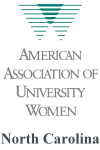|
AAUW NC
Tar Heel News
Fall 03 issue
Front page
Public Policy
SAR
AAUW NC
Branches
|
|
Leadership Conference: Communication Experts Share Tips
Mimi Cunningham, Theresa Shank, and Paula Wolf were the panelists for a program
on leadership skills at the Summer Leadership Conference in Jacksonville. Each
one shared communication tips with conference participants, prior to leading individual
workshops in which they directly addressed their specialties. Reports from each
workshop are on page five.
- Theresa: Ways to develop personal power to get through to people include
recognition-write notes to people, show up face-to-face/get beyond e-mail, follow-up
if something is not right, building credibility, and develop good listening
skills.
- Paula: Lobbying is about convincing people. "Voters"
is an important word to officials. Know how to get what you want. Study voting
records. Understand the process. Know the people involved-who they are, where
they are, what they do. Lobbyists in North Carolina represent over 700 organizations.
- Mimi: Media relations is about convincing people-letting
the public know how important positions and issues relate to the local community.
Use the media for more than just reporting; state the situation, decide what to
do, mobilize public response to achieve goals. Let the media know you are trying
to do something good for the community.
The Workshops
Communication/Group Dynamics
Reporter: Bobbie Edmisten, Statesville
After asking how many of us could engage in small talk, Terry Shank, consultant/trainer
in group dynamics and people skills, indicated that good communication can be
as simple as small talk with a purpose. She suggested that an effective communicator
should feel she is a hostess, observe facial and eye expression, and be aware
that nodding does not necessarily indicate agreement. She also said that location
in relation to another person is important. Height and space can be intimidating.
Voice tone and volume, as well as speed, contribute greatly to what is being communicated.
Networking helps attract media coverage and increases membership. Confidence
is important. Give a business card with a phone number and address to contact.
Taking someone with you and knowing who you are going to see is helpful, especially
when fund-raising.
Shank stressed that listening, not only to content, but also for feeling, is
a major part of communicating. Participants in her workshop completed and scored
a Listening Skills Assessment and were given feedback on the assessment items.
Obstacles to listening were brainstormed and discussed by participants.
Shank also addressed team meetings: good teams have five to ten persons with
appropriate skills, who agree on a purpose, and commit to working together to
reach measurable goals in a stated period of time. Meetings should begin and end
on time, procedure and content should be differentiated, and should include an
agenda with time elements. They should encourage open discussion, invite participation
of quieter members, and prevent monopolization by one or a few. Accept the inevitability
of conflict and make it constructive. Find ways to reward participants with praise
and celebrate team accomplishments.
Everything is Political
Reporter: Pat Abell, Statesville
Paula Wolf, chief lobbyist for the Covenant with North Carolina's Children,
explained the Covenant evolved from the discussion of universal health care and
a concern for welfare reforms in the early 1990s. Hired as a lobbyist, Paula is
now part-time executive director. She is known as the "Child" Lobbyist.
Paula reviewed the makeup of the legislature and Covenant successes, which are
N.C. Health Care Act, Independent Living Act, Bicycle Helmets, and Infant Homicide
Prevention Act. Her suggestions for successful lobbying include:
- Be specific when you write or talk with a legislator. Use one
page, big print, and concise language if you give her/him a handout.
- Know your stuff, know the opponent's stuff, and know stuff about the legislator.
- Join a group. There is power in numbers.
- Be polite and respectful. Never threaten.
- Visit in person and ask if specifically if he/she will vote with you.
- Meet with the opposition to see if there is a possible compromise.
- Have information for the legislator about
a. The cost
b. What other states
are doing
c. The opposition
- Thank the legislator, praise him/her publicly, and give awards.
- Give good press in his/her local paper
She suggests getting to know your representative, stay informed, call, write,
and e-mail him/her. The democratic process works - if you participate.
Media & PR for Non-Profits
Reporter: Marty Folsom, Statesville
What is PR?
* Good performance, publically
expressed
* Performance-recognition
* Doing good and getting
credit for it
Non-Profit vs. For Profit
* Caused-related vs. profit-motivated
* Volunteers seeking to
better community vs. purchase of advertising
* Non-profit easier than
for profit
Questions to ask about PR
* Why do we need/want PR?
* Who are we trying to
reach?
* What do we want to accomplish?
* What are the messages?
* What media are most
effective for reaching target audience?
* How do we evaluate success?
Using PR
* Promote issues, not
membership
* Mass media is valuable
for disseminating message; builds credibility; informs public
* Have event, such as
breakfast, and invite media
* Choose days/times for
releases carefully
* Direct mail, letters
to editor, radio talk shows, organization newsletters
* Know the media reps
you are courting
* Choose appropriate outlets;
read/listen
* Send thank-you notes
Ask
* Who do people in our community
really listen to? Enlist their assistance.
|

